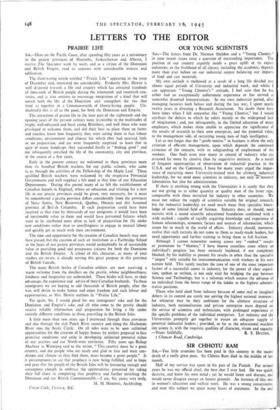OUR YOUNG SCIENTISTS
Stit,—The letters from Dr. Norman Sheldon and a "Young Chemist" in your recent issues raise a question of outstanding importance. The position of our country urgently needs a great uplift of its export industries, as the livelihood of all classes, including the academic, depends more than ever before on our industrial output balancing our imports of food and raw materials.
My own outlook is mellowed as a result of a long life divided into almost equal periods of University and industrial work, and whilst I can appreciate " Young Chemist's " attitude, I feel sure that he has either had an exceptionally unfortunate experience or has arrived at somewhat distorted interpretations. In my own industrial period, after managing factories both before and during the last war, I spent nearly twelve years in directing a Research Association. No doubt there have been times when I felt somewhat like " Yoting Chemist," but I would attribute the defects to which he refers mainly to the widespread lack of imagination ; and, not infrequently, to the limited education of many employers, which makes them unable to appreciate the significance of the results of research to their own enterprise, and the potential value, to the management side, of recruiting young men of high intelligence.
Let us not forget that the " profit motive" in business is often the only criterion of efficient management, upon which depends the continued existence of the concern, with its safeguarding of employment of the workers. One finds even now many in control of industry who are actuated far more by creative than by acquisitive instincts. As a result of frequent opportunities of observation of industrial practice in the U.S.A. and on the Continent, I have for many years urged the impor- tance of recruiting more University-trained men for ultimate industrial leadership, for we need more scientists in industry, not only—iliresearch laboratories but also for administration.
If there is anything wrong with the Universities it is surely that they are not giving us in either quantity or quality men of the latter type, comparable with those recruited for industry in other countries. We must not reduce the supply of scientists suitable for original research, but for industrial leadership we need much more than specialist know- ledge of some limited, field of Science. Industry does, or should, need recruits with a sound scientific educational foundation combined with a wide outlook ; capable of rapidly acquiring knowledge and experience of human relationships, economic factors and sources of information, which count for so much in the world of affairs. Industry should, moreover, realise that such recruits do not come to them as ready-made leaders, but need opportunity and further training to bring them to full fruition.
Although I cannot remember coming across any " cooked " results or promotion by " blarney," I have known countless cases where an individual's progress has been seriously hindered, if not completely blocked, by his inability to present his results in other than the specialist " jargon" only suitable for intercommunication with workers in his own narrow field. This surely touches the core of one of the most important factors of a successful career in industry, for the power of clear exposi- tion, spoken or written, is not only vital for bridging the gap between Science and Technology, but is a talisman which assures the advance of an individual from the lower rungs of the ladder to the highest adminis- trative positions.
Those who hold aloof from industry because of some real or imagined defects in its control are surely not serving the highest national interests ; for whatever may be their ambitions for the ultimate structure of industry, both nationalisation and private enterprise must depend on the service of scientists and technicians, with prolonged experience of the specific problems of the individual enterprises. Let industry and the Universities promptly get together to assure an adequate supply of potential industrial leaders ; provided, so far as the educational machine can assure it, with the requisite qualities of character, vision and sagacity.
—Yours faithfully, R. S. Hurrox. r Chaucer Road, Cambridge.


























 Previous page
Previous page